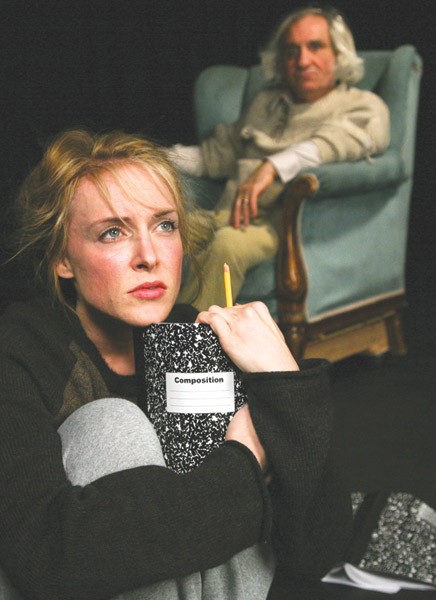“This play is partly about madness and the effect that madness has on a family,” observes actor Alan Kaplan of David Auburn’s Tony- and Pulitzer-winning play Proof, opening this weekend in the Studio at Sixth Street Playhouse.
“It’s also about work,” continues Kaplan, who portrays unstable mathematical genius Robert, a legend whose mental illness has sent shockwaves that still reverberate through the choices and fears of his two adult daughters, Claire and Catherine. “This guy keeps busy,” Kaplan observes, “he encourages his daughter to keep busy, to fight off those feelings of madness and craziness.”
Out in the studio, where the impressive set—a wintry Chicago backyard—is being constructed, a noisy quartet of drills, hammers, voices and sound-cue tests has sent Proof‘s own quartet of actors into this tiny dressing room. Joining Kaplan are Dana Scott (Catherine), Jill Zimmerman (Claire) and Mark Bradbury (Hal, one of Robert’s former math students). With the exuberant sounds of carpentry underscoring the conversation, the cast attempts to explain what, exactly, Proof—part family drama, part love story, part mystery—is really all about.
“I feel it’s about family dynamics and the roles that we play in our families,” offers Zimmerman. “We have one role with our parents and maybe a different role with our siblings. Those roles are our identities, and sometimes it’s very hard to break out of those identities. In Proof, that’s what’s happening between the two sisters. I’ve made up my mind, a long time ago, who Catherine is, and in the play, my view of her is challenged—and that’s very troublesome to me, because I don’t know how to see here any other way.”
“For me, the title of the play has a lot to do with what this work is about,” adds Scott, raising her voice to be heard above an electric drill just outside. “The title is indicative of so much more than just a mathematical proof. To me, this is a story of how we show our love, how we prove our love to others. Claire loves Catherine by trying to control her and take care of her. Hal and Catherine explore a budding love, but there are a lot of trust issues there. And with Catherine and her father, that proof of love happens in the way she’s devoted herself to caring for him, physically, when he’s ill. So to me, this play is about the proof of love, proof of what we mean to each other in a very deep way.”
“The word ‘proof’ has a lot of different meanings,” Bradbury chimes in, “so it’s a great title for the play. This play is about trust. It’s about vulnerability, about being willing to share what you’ve created, to share yourself, to share your love with someone else.”
Directed by David Lear, this production takes full advantage of the close quarters inside the studio, and the cast is clearly energized by the opportunity to perform so intimate a play in so cozy an environment.
“I love working in the studio theater,” says Bradbury, who’s performed more than a dozen shows in Sixth Street’s larger G.K. Hardt Theater but is appearing for the first time in the Studio. “There’s an intimacy here that is very special,” he says.
“David has described this space as being very ‘cinematic,'” adds Zimmerman, “and I think that’s a good way of putting it.”
“We can take each scene really deep,” agrees Scott. “We can take every moment right down to the bones.”
“Exactly,” nods Kaplan. “A show like this, in a space like this, there is no need for a lot big bells and whistles. The production values are all in the connection between these incredible characters.”











